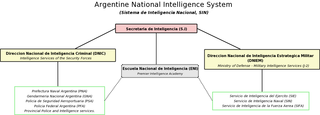
The National Intelligence Centre is the Spanish official intelligence agency, acting as both its foreign and domestic intelligence agency. Its headquarters are located next to the A-6 motorway near Madrid. The CNI is the successor of the Centro Superior de Información de la Defensa, the Higher Centre for Defence Intelligence. Its main target areas are North Africa and South America and it operates in more than 80 countries. CNI's official budget for 2023 is approximately €337.1 million.

Sistema de Inteligencia Nacional is the official denomination of the Argentine national intelligence community.
Dirección Nacional de Inteligencia Criminal is an Argentine intelligence agency, part of the National Intelligence System. It used to depend on the Secretaría de Seguridad Interior, which itself depends on the Ministry of Interior; currently, the DNIC depends from the National Ministry of Security. The DNIC is not a division of the Secretaría de Inteligencia (SIDE), which has its own Directorate of Interior Intelligence.
The National Intelligence Service was an intelligence agency of the Government of Peru that existed from 1960 to 2001. It was headquartered at the Quiñones Building, the headquarters of the country's Defence Ministry.

The Federal Police, formerly known as the Policía Federal Preventiva and sometimes referred to in the U.S. as "Federales", was a Mexican national police force formed in 1999. In 2019 it was incorporated into the National Guard and operated under the authority of the Department of Security and Civil Protection.
Mexico's law enforcement operates with three distinct powers of authority and jurisdiction: federal, state and municipal. With the recent reform of former president Andres Manuel Lopez Obrador on Mexico's Federal Police, the agency was dissolved due to corruption, links with organized crime and similar issues. A new agency replaced the Federal Police which is the Mexican National Guard.
The Ministry of the Interior of Uruguay is the ministry of the Government of Uruguay that is responsible for controlling, regulating and evaluating policies, programs and plans related to public safety, as well as guaranteeing citizens the free exercise of fundamental rights and freedoms.
The Agencia Nacional de Inteligencia (ANI) is the Chilean government national intelligence agency. Created in 2004, its mission is to coordinate, and advise the President on, intelligence. It is attached administratively to the Ministry of the Interior. Its current director is Gonzalo Yuseff Quiroz. The previous director was Gustavo Villalobos, who was also the last director of Directorate of Public Security and Information. ANI's budget is approximately US$4 million.

Law enforcement in Mexico City is provided by two primary agencies; the Secretariat of Citizen Security of Mexico City, who provide uniformed or preventative police, and the Office of the Attorney General of Mexico City who provide plainclothes detectives and crime lab services.

The Dirección Federal de Seguridad was a Mexican intelligence agency and secret police. It was created in 1947 under Mexican president Miguel Alemán Valdés with the assistance of U.S. intelligence agencies as part of the Truman Doctrine of Soviet Containment, with the duty of preserving the internal stability of Mexico against all forms of subversion and terrorist threats. It was merged into the Centro de Investigación y Seguridad Nacional (CISEN) in 1985.

The Intelligence Center for Counter-Terrorism and Organized Crime is the Spanish domestic intelligence agency responsible for the prevention of terrorism, organized crime and other violent radical organizations by managing and analyzing all internal information of the country. It was formed in October 2014 by merging of the National Anti-Terrorism Coordination Center and Intelligence Center against Organized Crime.
The GeneralDirectorate of Political and Social Investigations, was one of the two main domestic intelligence and security service of the United Mexican States. Created in 1918 as Sección Primera, under President Venustiano Carranza's administration, it reported directly to the office of the president. After the consolidation of the post-revolutionary Mexican political structure, and the rise of the Institutional Revolutionary Party, its jurisdiction changed to that of the Mexican Secretariat of the Interior. In 1985, following a political crisis involving the death DEA agent, the DGIPS was combined with its sister agency, the Federal Security Directorate, creating the Center for Research and National Security which is active to this day.

The Ministry of the Presidency is a ministry of the Republic of Costa Rica created on 24 December 1961 through Law 2980. Its work prescribed by law consists in providing support to the President of the Republic, serving as a liaison between the Presidency and the other branches of government, civil society and the various ministries.

Andrés Manuel López Obrador's tenure as the President of Mexico began with his inauguration on 1 December 2018. López Obrador, a member of the National Regeneration Movement (MORENA) and former Head of Government of the Federal District, had previously run for president in the 2006 and 2012 elections. He assumed office following a landslide victory in the 2018 presidential election. Upon his inauguration, he became the oldest person to hold the office since the change to a six-year term of office.
The Secretariat of Security and Civilian Protection is a cabinet-level agency of the government of Mexico responsible for supervising public safety and security, including the National Guard, National Intelligence Center and the penitentiary system. Its secretary was Alfonso Durazo until October 2020 when he resigned to run for governor of Sonora.
Jorge Carrillo Olea is a Mexican politician and general, and a member of Institutional Revolutionary Party, PRI. He served as governor of Morelos from October 1, 1994, to May 15, 1998.

Paz Esteban López is a Spanish intelligence officer. She served as Director of the National Intelligence Centre (CNI) from 2020 to 2022. She was the first woman to hold the post and was previously the Secretary-General of the agency from 2017 to 2019, under Félix Sanz Roldán. In 2022, she was removed from her position as CNI director following revelations, which came to be known as CatalanGate, where various national and regional politicians had been targeted by phone tapping through Pegasus spyware.
Esperanza Casteleiro Llamazares is a Spanish intelligence officer who serves as director of the National Intelligence Center since May 2022. She was previously Secretary of State for Defense from 2020 to 2022.









